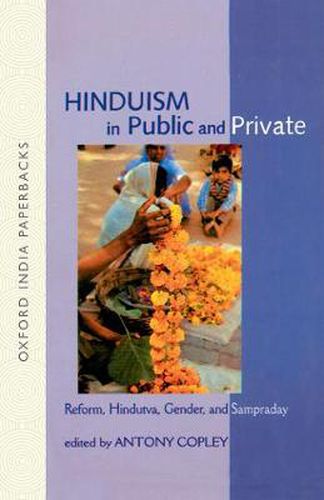Readings Newsletter
Become a Readings Member to make your shopping experience even easier.
Sign in or sign up for free!
You’re not far away from qualifying for FREE standard shipping within Australia
You’ve qualified for FREE standard shipping within Australia
The cart is loading…






Beginning with the premise that any pursuit of an Indian identity in the narrow terms of Hinduness is a radical distortion, this significant volume attempts to investigate why there might be a need for a new kind of social integration within the Hindu community in India. It looks at the phenomenon of religious reform movements in terms of the larger paradigm of modernisation, and in collusion with the ideas of nationalism and Hindutva. In doing so, it attempts to answer the question, what indeed is the role of religion in society. Is it essentially a matter of private faith, or does it ineluctably play its part in society at large?
The first few essays analyse the influence of key personalities such as Vivekananda, Aurobindo, and Dayanand Saraswati on the rise of ideas which later came to be known as Hindutva. The later essays in the volume address the public-private paradigm more directly as they look at ‘feminist’ movements associated with Hindutva and more contemporary Hindu reform movements. In conclusion, the essays demonstrate that while the exact connection between Hindutva and the religious reform movements remain uncertain, it is clear that a specifically religious or Hindu nationalism grew out of the same intellectual climate as the secular freedom struggle. The volume serves the crucial purpose of answering many questions about the Hindutva movement which have troubled the individual consciousness for a long time.
$9.00 standard shipping within Australia
FREE standard shipping within Australia for orders over $100.00
Express & International shipping calculated at checkout
Beginning with the premise that any pursuit of an Indian identity in the narrow terms of Hinduness is a radical distortion, this significant volume attempts to investigate why there might be a need for a new kind of social integration within the Hindu community in India. It looks at the phenomenon of religious reform movements in terms of the larger paradigm of modernisation, and in collusion with the ideas of nationalism and Hindutva. In doing so, it attempts to answer the question, what indeed is the role of religion in society. Is it essentially a matter of private faith, or does it ineluctably play its part in society at large?
The first few essays analyse the influence of key personalities such as Vivekananda, Aurobindo, and Dayanand Saraswati on the rise of ideas which later came to be known as Hindutva. The later essays in the volume address the public-private paradigm more directly as they look at ‘feminist’ movements associated with Hindutva and more contemporary Hindu reform movements. In conclusion, the essays demonstrate that while the exact connection between Hindutva and the religious reform movements remain uncertain, it is clear that a specifically religious or Hindu nationalism grew out of the same intellectual climate as the secular freedom struggle. The volume serves the crucial purpose of answering many questions about the Hindutva movement which have troubled the individual consciousness for a long time.